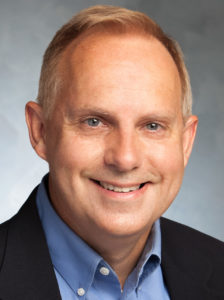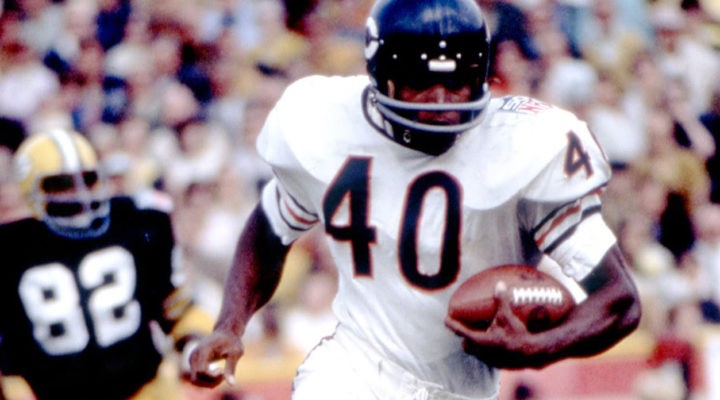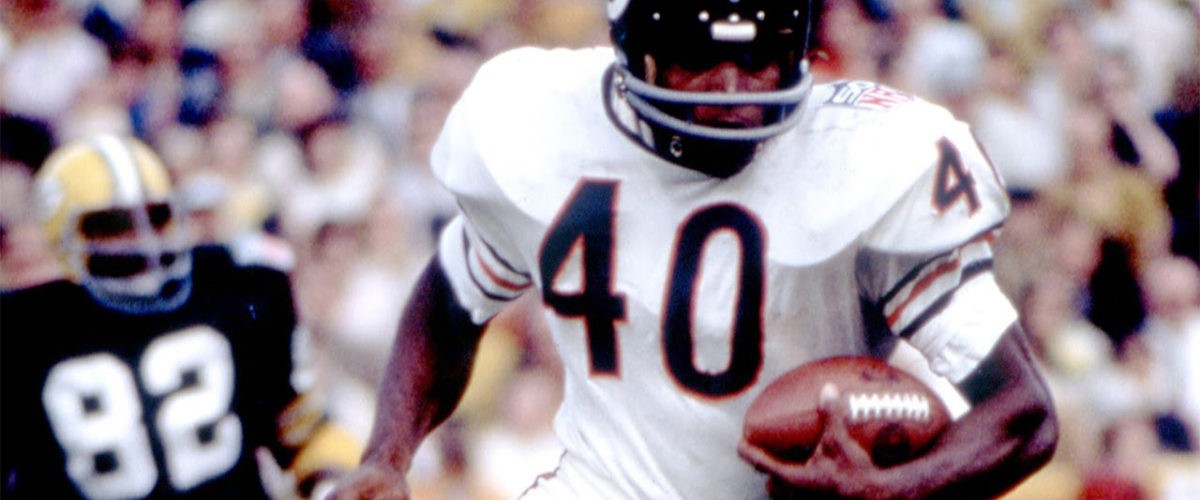The great Chicago Bears running back Gale Sayers died recently. I admired him for what he did with a football in his hands, but what lingers with me are two books about him I read when I was a kid.
One was Brian’s Song, a biography about Sayers’ road roommate, Brian Piccolo, who died young of cancer and was immortalized in a heart-rending TV movie of the same name. The other was Sayers’ autobiography, I Am Third, in which he told his story, Brian’s, and explained his philosophy of life.

Greg Garrett
Gale Sayers was a great football player, and during my childhood I would have described him as one of my heroes. But while Sayers was clearly the greater talent on the field, he regarded Piccolo as a hero for his courage and tenacity off the field. I remember weeping — and still choke up now as a grown man — at the scene in the film Brian’s Song where Sayers (Billy Dee Williams), in accepting the George S. Halas Award for Courage, draws attention toward his friend’s bravery and away from himself:
You flatter me by giving me this award. But I say to you here and now, Brian Piccolo is the man of courage who should receive the George S. Halas Award. It is mine tonight, Brian Piccolo’s tomorrow. I love Brian Piccolo, and I’d like all of you to love him too. And tonight, when you hit your knees, please ask God to love him.
Park that for a second. I’m going to come back to it. But because 2020 is an election year and a plague year, I’m also thinking about our addiction to rights, about people who say they won’t wear a mask or social distance because it feels like giving up their freedom, about the balance between individuals and any larger community to which they belong.
During the two years leading up to the 2012 general election, I did a weekly thought experience for Patheos. In my weekly column “Faithful Citizenship” (and the later book of the same name), I tried to respond to issues in the news and in the nation through the lens of faith, instead of my default reaction, which was through the lens of my political party affiliation.
I discovered how incredibly difficult it was to do that, and one of my global takeaways was that I — like many others — can be driven more by politics than by faith commitments. And so, as I explored things like the Second Amendment and gun control through a theological lens, it was fascinating to me how differently we might make decisions if we identified ourselves first as Christians and second as Democrats or Republicans.
Being a member of a political party can be about winning and only winning, but our lives can’t simply be oriented around victory over those who disagree with us. That’s ultimately not healthy spiritually or politically.
“Being a member of a political party can be about winning and only winning, but our lives can’t simply be oriented around victory over those who disagree with us.”
Which brings me back to Gale Sayers: he could have leveraged his extraordinary talent simply into wealth and fame, could have made all things about himself. But the title of his autobiography has been a lesson to me my entire life, even when I haven’t managed to live up to it.
I Am Third takes its name from a saying that might represent the basis for every faithful life: “God is first, my friends are second, and I am third.” H. Richard Niebuhr also noted the tendency of even faithful people to put other things before God. In Radical Monotheism and Western Culture, he opined that when most of us talk about our faith, it is “a mixture of faith in the One God with social faith and polytheism,” not “radical monotheism,” an overarching belief in the One and Living God.
God’s command to have no other god before him emerges from the human impulse to privilege our devotion to ourselves and, maybe, to a whole lot of secular values. That impulse damages our relationship with God, with each other, and ultimately, with our own best selves.
Augustine, in City of God, actually defines sin as love of oneself to the point of contempt for God. But if we imagine that our faith and our faithful response to God are the defining elements of our lives, and that our love for others becomes the next most important element, then by placing ourselves third, we will be living a life that brings the greatest good to others (and, paradoxically) to ourselves.
I remember that the first time that I heard Augustine’s famous pronouncement, “Love God and do what you will,” I was pretty excited. I thought it was a saint-approved license for me-dom. “I love God,” I thought, as I understood that concept before meeting Richard Niebuhr. “And I love doing whatever I want. So this works out pretty well for me.” Please tell me I’m not the only person who ever thought this.
“In Christian life, responsibility for others is often the essential check on our impulse for absolute freedom.”
But from the standpoint that “I am third,” I hear this pronouncement as Augustine meant it, filtered through the two-fold commandment of love (love God, love your neighbors): If am truly placing God on the throne of my life, if God is truly first, then my values will be God-values, and the choices I make — political choices, personal choices, faith choices — will reflect that. I will show my love for God by serving others. I will show my love for God by balancing their well-being with my own desires. And if I begin to do that, then I begin to make all my decisions in a way that honors others, and not just myself.
Just because I can do something doesn’t mean I should. And in Christian life, responsibility for others is often the essential check on our impulse for absolute freedom.
God is first.
Others are second.
And I am third.
What would it truly look like in our personal lives, in the church, and in our political lives to live out the benediction “Go in peace to love and serve”?
I would very much like to find out.
Greg Garrett is professor of English at Baylor University, theologian in residence at the American Cathedral in Paris, and author of two dozen books, among them the new A Long, Long Way: Hollywood’s Unfinished Journey from Racism to Reconciliation.


